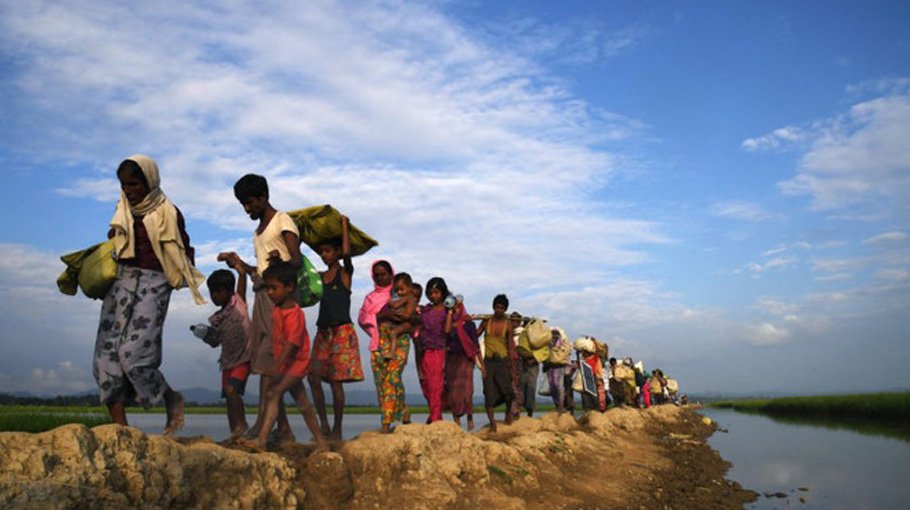Shifting global attention signals catastrophe for Rohingya refugees

In the midst of turmoil in the Middle East, the world’s attention has been understandably preoccupied. Yet, there are corners of the globe where human suffering is unseen and happening in slow motion. The Rohingya refugee crisis in Bangladesh is one such tragedy. For years, Medecins Sans Frontieres has been a lifeline for Rohingya refugees, providing essential medical services to this vulnerable population. However, MSF has now reached a breaking point in several areas, and the consequences of this will have long-lasting, devastating effects on the Rohingya and place an even heavier burden on Bangladesh.
The Rohingya, a Muslim minority group from Myanmar, have faced decades of persecution and violence in their homeland. Fleeing for their lives, hundreds of thousands of Rohingya sought refuge in Bangladesh. As the crisis unfolded, the international community rallied to support these refugees. MSF, also known as Doctors Without Borders, was one of the leading organizations providing assistance, and has been instrumental in delivering essential medical care, including maternal health services, surgery, and treatment for malnutrition and infectious diseases.
However, the sad truth is that the Rohingya crisis is no longer at the forefront of the world’s attention, and the consequences are dire. MSF has been forced to announce a reduction in its services, citing a lack of funding and the overwhelming strain on its resources. This devastating decision comes on the heels of another concerning development: the World Food Programme’s decision to reduce the value of food vouchers for the Rohingya. Together, these actions signal a dangerous and impending catastrophe for the refugees.
The immediate implications of these cutbacks are obvious. Reduced access to medical care and diminished food supplies will inevitably lead to more suffering, illness, and malnutrition. It is a brutal equation that threatens the lives of the most vulnerable, primarily women and children.
Malnutrition, in particular, is a silent killer. Even before the recent food ration reductions, rates of malnutrition among Rohingya children were alarming. This condition not only stunts physical growth, but can also result in lasting cognitive impairment. With fewer calories to go around, more children will face the lifelong consequences of malnutrition, hampering their ability to recover and rebuild their lives when conditions eventually improve.
Other aspects of the humanitarian response in Bangladesh are also being scaled back.
But the longer-term effects of these cutbacks are even more disturbing. As MSF’s services decline, other aspects of the humanitarian response in Bangladesh are also being scaled back. This not only leaves the Rohingya increasingly vulnerable, but also places a growing burden on the shoulders of Bangladesh, a nation already grappling with its own challenges.
One of the most critical long-term consequences is the strain on the local healthcare system in Cox’s Bazar, where most Rohingya refugees are concentrated. The local health infrastructure is already stretched thin, struggling to even meet the needs of the Bangladeshi population. As MSF reduces its services, more pressure will be placed on an already fragile system, potentially leading to the collapse of services for everyone in the area.
Moreover, the Rohingya crisis has also had significant political and economic implications for Bangladesh. The Bangladeshi government has shown remarkable generosity by hosting nearly a million Rohingya refugees, but this has come at a substantial cost. The refugee presence has placed immense pressure on local resources, including water, land, and infrastructure. As the crisis drags on, it poses a threat to social cohesion and stability within the host community, with resources becoming scarcer and resentment growing.
The lack of international funding and assistance is a damning indictment of the global community’s commitment to addressing this crisis. It reflects a failure to recognize that humanitarian needs do not magically disappear because the world’s attention has shifted elsewhere. Rohingya refugees are human beings, deserving of the same rights and dignity as any other individual on this planet. Their suffering should not be forgotten, ignored, or dismissed.
We must come together to address the immediate needs of the Rohingya.
While Bangladesh has shown incredible generosity in hosting the Rohingya, the international community must do its part. Humanitarian organizations, such as MSF, should not be forced to reduce their operations due to a lack of funding. The international community must provide the financial support necessary to ensure that the Rohingya receive the medical care and nutrition they desperately need. Moreover, it should work toward a durable solution to the Rohingya crisis that allows these displaced people to return to their homes in Myanmar, where their rights and safety can be guaranteed.
Inaction and indifference are not acceptable options. It is incumbent on all nations to recognize the urgency of the situation and provide the necessary support to alleviate the suffering of the Rohingya refugees. The consequences of failing to act are not only the immediate suffering of these vulnerable people, but also the long-term burden placed on Bangladesh and the destabilization of the entire region.
The Rohingya crisis is a human tragedy of immense proportions. MSF’s recent cutbacks in services and the World Food Programme’s reductions in food rations represent a stark warning that the international community cannot afford to ignore. We must come together to address the immediate needs of the Rohingya, and work toward a just and lasting solution to this crisis. The world’s conscience is at stake, and our collective humanity is being tested. Let us rise to the occasion and extend a lifeline to the Rohingya refugees, so that their suffering may finally come to an end.
Dr. Azeem Ibrahim is director of special initiatives at the New Lines Institute for Strategy and Policy in Washington, D.C., and the author of ‘The Rohingyas: Inside Myanmar’s Genocide’ (Hurst, 2017).
Source: Arab News


